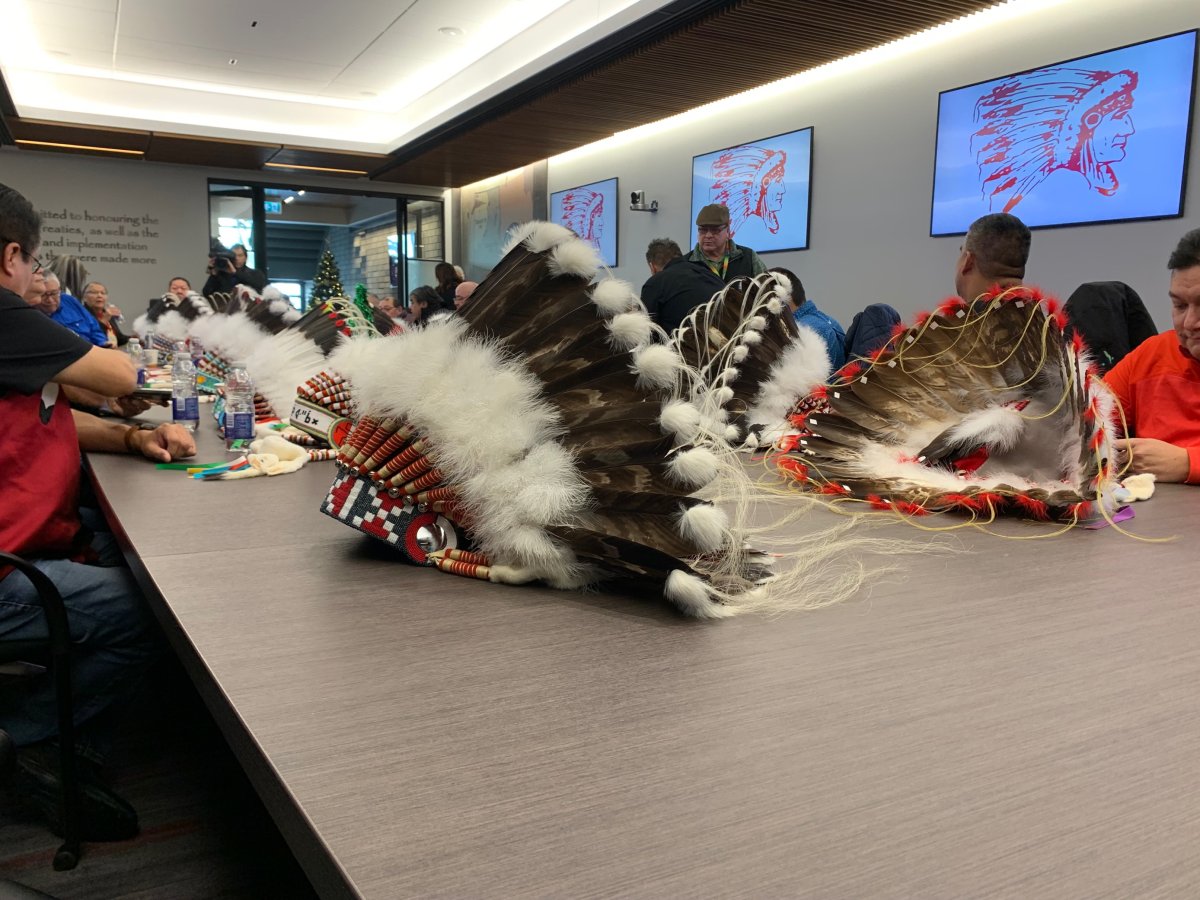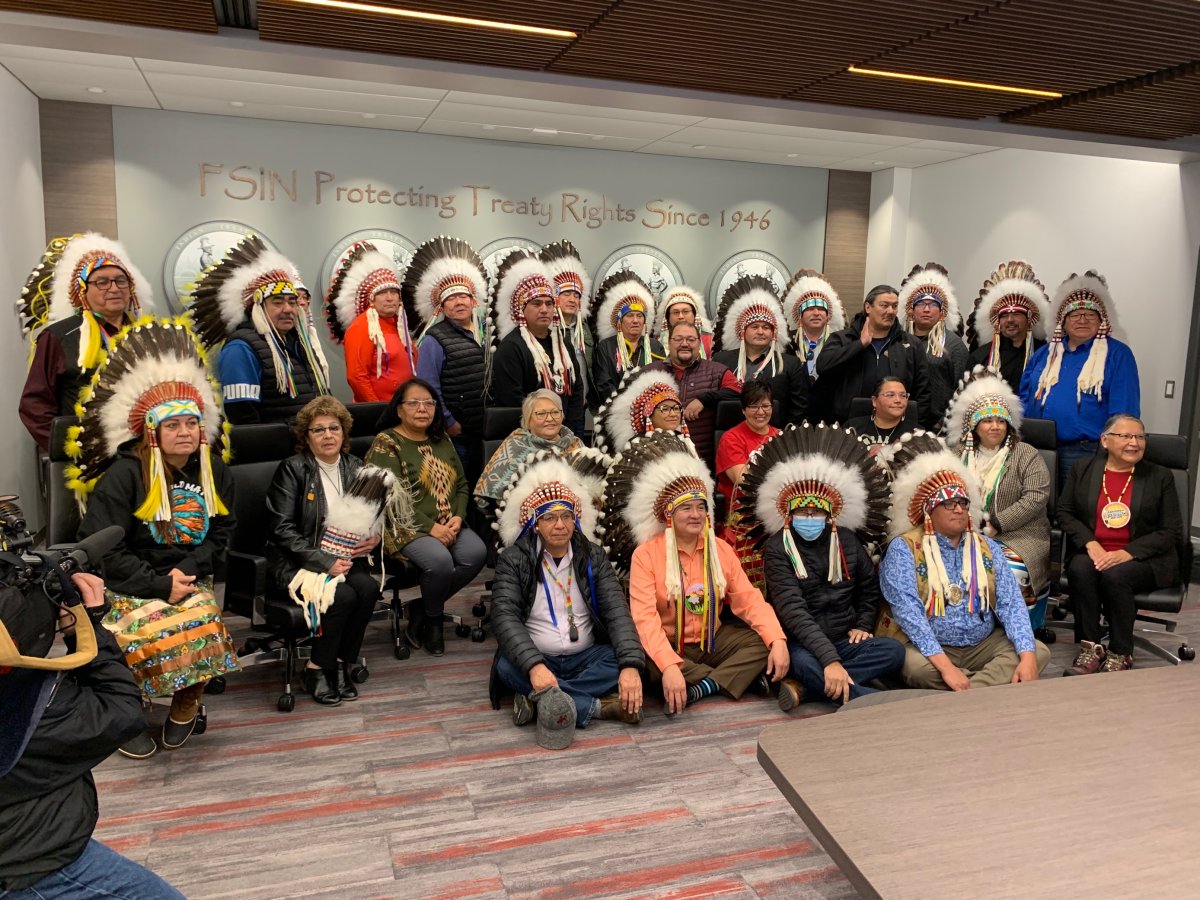The Federation of Sovereign Indigenous Nations (FSIN) gathered chiefs from all over Saskatchewan on Friday to call attention to the government of Saskatchewan’s “continual infringement on First Nations inherent and treaty rights.”

Regional Chief Bobby Cameron and more than 30 other chiefs spoke out against the Saskatchewan First Act, which would give the province independent powers over its natural resources.
Chief Margaret Bear of Ochapawace First Nation started the event and said she wants Premier Scott Moe to hear their words.
She said they were the original rights holders of his land, noting that treaties were signed before Saskatchewan was even a province.
“This is a breach,” Bear said.
She said they will not sit back while political parties steal resources from the land.
“The Canadian government and Saskatchewan talk reconciliation, but where is the action?”
She said there’s colonial thinking that Saskatchewan has exclusive rights to the land and resources within the Saskatchewan First Act, and she wants Moe to repeal the act.
Vice Chief Richard Durocher from Meadow Lake Tribal Council said the province of Saskatchewan continues to give away Indigenous land.
“This is just another stepping stone for them, for getting what is ours,” Durocher said.
He said northern Saskatchewan has to fight the government for anything better they want for their children, noting they have poor roads, poor education and poor infrastructure.
Chief Joyce Naytowhow from Montreal Lake Cree Nation said she was brought up in the trapline, noting that it’s very troubling to hear the Saskatchewan First Act being brought forward by Moe.
She said Indigenous people have a larger voice now and need to stand together and call on the province to work together with them.
“Today we are here to question Scott Moe,” Naytowhow said.
She said he has a duty to consult with First Nations.
“We have to protect the resources we have in our communities,” Naytowhow added.
Chief Cheryl Kahpeaysewat from Moosomin First Nation said the act from the province has no acknowledgement towards First Nations or their rights.
“The Saskatchewan First Act is simply bad law,” Kahpeaysewat said.
Chief Tammy Cook-Searson from Lac La Ronge Indian Band agreed, noting that the act had a complete disregard for First Nations.
Chief Evan Taypotat from Kahkewistahaw First Nation said the only way to get the Saskatchewan government to listen is to hit them in their bottom line.
“We got to band together,” Taypotat said.
He called on the chiefs and FSIN to make a plan, noting action needs to happen.
“Kahkewistahaw Nation is ready to fight.”
Chief Teddy Clark, Clearwater River Dene Nation, said First Nations need to write their own policies.
Clark said he’s pro-development, adding that the industry’s success on First Nations land needs to be based on First Nation’s success.
Cameron said these press conferences show the unity of First Nations.
He said they are getting to the point of blockading.
“You have to take serious action,” Cameron said.
“When all else fails, we will blockade.
“We are kind people — to a certain point.”
Global News reached out to the Saskatchewan government and received the following statement.
“This Bill asserts the exclusive jurisdiction of Saskatchewan over laws with respect to matters set out in sections 92 and 92A and does not restrict or limit existing First Nations rights.”
“Section 35 of the Constitution Act, 1982 recognizes the existing Aboriginal and treaty rights of First Nations people in Canada. Section 2-43 of Saskatchewan’s Legislation Act provides that ‘no enactment abrogates or derogates from the existing Aboriginal and treaty rights of the Aboriginal peoples of Canada that are recognized and affirmed by section 35 of the Constitution Act, 1982.'”








Comments